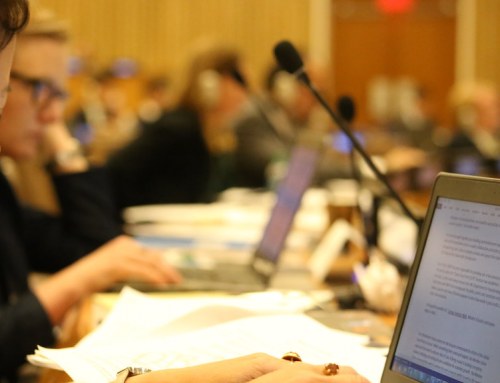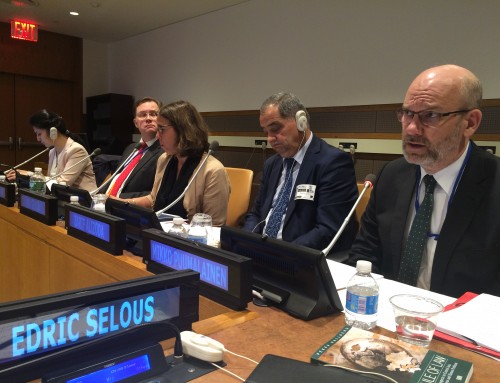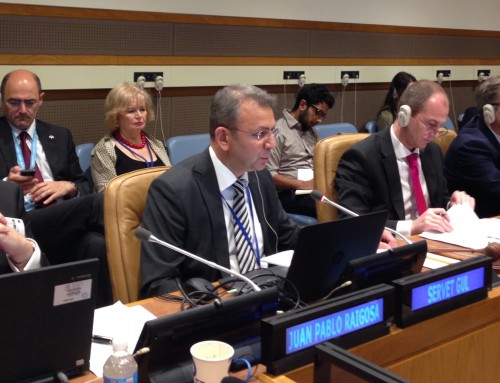The Permanent Missions of the Republic of Singapore, the Republic of Cyprus, and the Republic of Trinidad and Tobago to the United Nations, in cooperation with the Rule of Law Unit on behalf of the UN Rule of Law Coordination and Resource Group (RoLCRG) organised a panel discussion on “Multilateral Treaty-Making: Perspectives on Small States and the Rule of Law” in New York on 19 May 2015. The event was organised as a side event in preparation of the discussion of the Sixth Committee of the General Assembly on “The Role of Multilateral Treaty Processes in Promoting and Advancing the Rule of Law”, as a subtopic of its annual discussion on “The Rule of Law at the National and International Levels” during the seventieth main session of the General Assembly.
The event provided an opportunity for an informal and open exchange of views on multilateral treaty-making and the rule of law. The speakers shared their views and experiences on multilateral treaty negotiations, as well as on the work of United Nations Commission on International Trade Law (UNCITRAL) and the International Law Commission (ILC) on multilateral treaties. The speakers spoke about the engagement of small States in these processes. The event was also an opportunity to examine the particular challenges small States face in multilateral treaty processes, building greater understanding between States on this integral aspect of the rule of law at the international level.
The discussion covered a number of important issues including: the multiple ways in which multilateral treaties and treaty-making processes contribute to developing and enhancing the rule of law; the definition of a ‘small State’ and whether it is a helpful and relevant term in the context of multilateral treaty-making; the challenges and possible solutions faced by small States in multilateral treaty-making, as well as advantages small States might have in these processes. The panellists also examined the role of UNCITRAL and the ILC in the process of multilateral treaty-making, and how small States are engaged within UNCITRAL and by the ILC. The panellists suggested ways of supporting small States in various multilateral treaty-making fora.
A number of key themes emerged during the course of the discussion. First, all the panellists emphasised the importance of the rule of law at the international and national levels, and multilateral treaties as an integral aspect of the rule of law at the international level. Second, all of the panellists emphasised that the contributions of small States are equally important and valuable in the development of international law and norms, including in the making of multilateral treaties. This holds true even if small States face practical challenges in participating in the process of multilateral treaty-making. Third, the forming of regional and other types of groups with a lead negotiator was one proven solution to the practical problems faced by small States in multilateral treaty negotiations, which include lack of financial and administrative resources, and a lack of capacity and personnel. Fourth, multilateral treaties and international rule of law are critical to the social and economic advancement of small States. Fifth, small States have played a vital role in the development of multilateral treaties and in the functioning of bodies such as UNCITRAL.
Ambassador Karen Tan, Permanent Representative of the Republic of Singapore to the United Nations delivered opening remarks setting the context for the discussion.
First, Ambassador Tan emphasised the ways in which multilateral treaty-making is instrumental in the advancement of international rule of law. She highlighted that multilateral treaty-making is an exercise of consensus building and contributes to the codification and development of customary international law. She also noted that multilateral treaties clarify and structure international relationships, which results in a more predictable and fairer global order.
Second, Ambassador Tan elaborated on the functions and opportunities small States have in multilateral treaty-making, emphasising in particular that small States are in fact central to the success of multilateral treaties and treaty regimes. Ambassador Tan observed that small States often bring to the table perspectives and resources that are different yet valuable. Small States are also well-placed to be bridge-builders between divergent voices during treaty-making processes. Ambassador Tan highlighted, as an example, the steps Singapore had taken in recognition of the vital role that small States can and should play in the development of the international system, namely (i) Singapore’s establishment of the Forum of Small States (FOSS), an informal grouping of 105 States all of which have populations of 10 million or less, and (ii) the integral role played by Singapore in forming the Global Governance Group (or 3G), which comprises 30 small and medium sized States and aims to promote the exchange of views on issues concerning global governance and small-State engagement in the G20 process. Ambassador Tan further pointed out various multilateral treaty processes in which Singapore had been an active participant, namely the negotiations for the UN Convention on the Law of the Sea, and the diplomatic conference that adopted the UNCITRAL Convention on the International Sale of Goods, where Singapore chaired the drafting group.
Third, Ambassador Tan observed that there are various existing platforms, such as the UNCITRAL and ILC, for small States to contribute as members of the international community. On this note, Ambassador Tan encouraged all participants to make full use of this forum to examine whether and how the existing design of multilateral treaty-making processes can be enhanced to facilitate the constructive contributions of small States.
Mr. Edric Selous , Director of the Rule of Law Unit in the Executive Office of the Secretary- General delivered introductory remarks on the broader perspective of the rule of law. The Office of Legal Affairs (OLA), a key member of the ROLCRG, discharges the Secretary-General’s function as depositary of multilateral treaties, which today number over 560. OLA registers and publishes all treaties, and maintains an electronic database and information system on them. The treaty section of OLA also provides advice and assistance to Member States.
Mr. Selous spoke about the ways in which multilateral treaties are important for the rule of law. Multilateral treaties are an integral aspect of a comprehensive and robust international legal framework, as a mechanism to ensure that the rule of law governs the relations between States of all sizes. The importance of multilateral treaties had been emphasized already in the UN Charter, the Preamble of which underlines the collective resolve of Member States “to establish conditions under which justice and respect for the obligations arising from treaties and other sources of international law can be maintained”. Multilateral treaty processes enhance universality, consolidate international consensus and provide certainty and accountability on rights and obligations of States. These are all critical elements of the rule of law. Multilateral treaties also facilitate peaceful settlement of disputes.
Mr. Selous noted that the issue would be addressed in the Secretary-General’s annual report on the rule of law, expected to be issued in August. There would also be an informal briefing with the Office of Legal Affairs at the end of June on the topic of this year’s Sixth Committee discussion on the rule of law, namely “The role of multilateral treaty processes in promoting and strengthening the rule of law”.
Ambassador Eden Charles , Deputy Permanent Representative of the Republic of Trinidad and Tobago to the United Nations, emphasised the importance of the principle of the sovereign equality of States. The Charter enables small States, such as Trinidad and Tobago, to participate efficiently and actively in the multilateral treaty-making processes. As a consequence, Ambassador Charles emphasised the role of the General Assembly in multilateral treaty-making and the importance placed by small States on the revitalisation of the General Assembly. In addition to providing the truly universal and equal forum for treaty-making, the General Assembly also provides an important platform for Member States to learn and exchange best practices in the implementation of multilateral treaties in the domestic sphere.
Ambassador Charles highlighted challenges faced by small States in multilateral treaty-making. These challenges include more limited financial and administrative resources, as well as staffing capacity challenges, particularly of legal staff. Some possible solutions to these challenges include: (i) forming regional groupings which might include appointing a lead negotiator to negotiate on behalf of the regional group, which is one of the ways by which the entire grouping could benefit from expertise that may not be available in individual States across the entire grouping. For example, the Revised Treaty of Chaguaramas which established the Caribbean Community including the CARICOM Single Market and Economy, provides for some measure of coordination of Foreign Policy. CARICOM States at the UN sometimes coordinate based on these provisions in the Treaty. CARICOM States negotiated together in the negotiations leading to the Arms Trade Treaty, which gave the group considerable influence; (ii) the capacity training to prepare a cadre of national lawyers to be able to participate in treaty negotiations and drafting; (iii) groupings across regions on issues of common concern where there is a meeting of minds. Examples of this include negotiations by small island States as part of the Alliance of Small Island States (AOSIS) on the issue of climate change, as well as negotiations by small States as part of G77 with other like-minded states, on issues such as the law of the sea.
Ambassador Charles also highlighted the important link between an international rule of law framework, and development and economic growth. He noted that legal certainty and coherence was important for multinational investors; in the case of Trinidad and Tobago, where the economy is largely driven by oil and gas, this was critical.
Ambassador Charles concluded by highlighting some crucial examples of the ways in which small States had influenced international law, including Trinidad and Tobago’s role in putting the idea of an International Criminal Court back on the international agenda. He also highlighted that numerous jurors from Trinidad and Tobago had played crucial roles in international institutions such as the International Law Commission which had drafted the articles on the establishment of the International Criminal Court.
Ambassador Andrew Jacovides , former Permanent Representative of the Republic of Cyprus to the United Nations, and former member of the International Law Commission highlighted the fundamental nature of the concept of the Rule of Law to the UN. Ambassador Jacovides set out the Secretary General’s definition of the rule of law and noted that ultimately the impact of any system of law depends on the will of those who have to enforce it. Smaller States have on the whole more reason to rely on the law, as it serves as a constraint on power by larger and more powerful States.
Ambassador Jacovides considered the role played by the ILC in multilateral treaty-making and the rule of law, as well as the role played by small States. He highlighted the ILC’s unparalleled achievements and contributions to the sphere of international rule of law particularly through its codification and progressive development of the law. Some important areas of the work of the ILC relating to the international legislative process which had been instrumental to the rule of law include the draft statute for the International Criminal Court in 1994, which was further elaborated by the preparatory committee for the International Criminal Court. Much of this work was done by pioneers coming from small States i.e. Cyprus as well as Trinidad and Tobago and Lichtenstein resulting in the Rome Statute of the International Criminal Court being adopted in 1998. Small States had also played a key role in the Kampala Definition of the Crime of Aggression. Another example of important work done by the ILC was the preparatory work and the draft articles on the Vienna Convention on the Law of Treaties, with significant contributions from small States in the Treaty itself, including the notion of jus cogens. Other areas where the ILC made important contributions were International Responsibility, the Law of the Sea, Diplomatic and Consular Intercourse and Immunities, International Watercourses, and Jurisdictional Immunities, among others.
Ambassador Jacovides underscored that previous Presidents of the ICJ pointed out that the advisory procedure provides the Court with a very real way of participating and contributing to the overall objectives of the United Nations and can play a role in dispute resolution by clarifying the legal parameters within which a problem may be solved. He also stressed that the example of the United Nations Compensation Commission (UNCC), established after the first Gulf War, as a major claims resolution facility to deal effectively with the financial consequences of a state’s responsibility for the violation of international law through invasion and occupation, ought to be the rule rather than the exception in world where the rule of law applies.
Mr. Renaud Sorieul , Secretary of the United Nations Commission on International Trade Law (UNCITRAL), gave the perspective of UNCITRAL on the issue of multilateral treaty-making and the rule of law.
Mr. Sorieul noted that while UNCITRAL had been working on the harmonization and modernization of trade law for a long time, its work had been only recently placed in the context of the broader concept of the rule of law. Noting the clear link between the two, UNCITRAL worked also to increase awareness about the importance of trade law at the domestic and international levels to the rule of law and the crucial connection of such awareness with economic and social development.
Mr. Sorieul noted that whilst multilateral treaty making is one way of standardising and unifying trade law and integral to the international rule of law framework, it is complemented by “soft law” instruments, since UNCITRAL primarily pursues its law-making activity through non-binding instruments. For example, even a treaty such as the United Nations Convention on the Contracts for the International Sale of Goods can be described as a “soft treaty”. There also exist numerous other soft law mechanisms such as Model Laws, Legislative Guides and model contractual documents. There needs to be greater awareness of these alternative harmonisation mechanisms at the national and international levels which are also pivotal to the rule of law.
Regarding the role of small States, Mr. Sorieul considered whether the distinction between ‘small States’ and ‘large States’ was relevant or helpful. While noting obvious difficulties (including financial) for small States to participate regularly in the work of UNCITRAL, he also stated that in many ways the size of the State does not make much difference to its participation in the UNCITRAL process and the level of influence that it may reach. The size of a State does not necessarily affect trade and technological sophistication with for example Singapore being extremely sophisticated on both fronts. In addition, Singapore as a result of the quality and intensity of participation in UNCITRAL has been pivotal in making UNCITRAL what it is in its almost 50 years of existence. Mr. Sorieul suggested that the smaller size of a State may even offer an advantage in terms of the States participation in UNCITRAL, as well as its ability to make developments in trade law at the international and national levels. For example, as a result of Singapore’s small size high level experts were able to participate in UNCITRAL meetings, over the years, such as the current Chief Justice and the Deputy Solicitor-General of Singapore. Mr. Sorieul also cited the pioneer role played by Malta in the 1990s in the area of trade and electronic connectivity. To some extent, the small size of States might make it easier to establish coherence and harmonisation amongst institutions.
Mr. Sorieul also pointed out that the challenges to the work of UNCITRAL in harmonising and standardising trade law are challenges posed equally by small and large States. In both small and larger States there is a need for greater capacity building and expertise with regard to the work of UNCITRAL, as well as the need to set up partner institutions at the national level for UNCITRAL to work with.
Discussion
A vibrant question and answer session, moderated by the Legal Advisor of the Permanent Mission of the Republic of Singapore, followed the panel discussion in which Member States discussed the themes raised during the discussion. Some of the questions discussed included whether small States are active in responding to the ILC’s requests for inputs on its work and whether members of the ILC think about the perspective of small States in the course of their work; the definitions of “small States” and whether developing States face the same challenges as small States in multilateral treaty-making; and how larger States and international institutions could support the role of small States in multilateral treaty making. Comments were also made regarding how Governments might be slow in acceding, ratifying and implementing multilateral treaties, if they felt that they have not had as much influence or input in their content. The benefits (in promoting rule of law) and challenges (potentially high costs being a barrier for small States) of international arbitration were also discussed.




